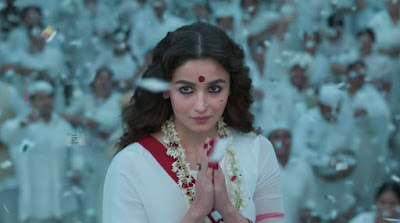To address the spectacle first (because there is a lot of it): Rajamouli has engineered a team-up between two men - cinematic exaggerations of real-life figures in the fight for Indian independence - who begin on opposite sides of the fence. My esteemed friend and colleague Baradwaj Rangan has already written about the film's mythological antecedents, which become more apparent and more important as RRR barrels onwards; I was initially reminded of Curtis Hanson's film of L.A. Confidential. Raju (Ram Charan) would be the Russell Crowe figure in this scenario: a hardnut police officer working with the British forces, who in an extraordinary early brawl leaps into the sea of protestors gathering outside his Delhi garrison to haul in the one unfortunate his paymasters have singled out for punishment - a bar-setting brouhaha that gradually assumes the form of a thousand-man pile-on. Bheem (NTR Jr.), a villager who arrives in Delhi looking for the child we've already seen being snatched away by the Governor's wife (Doody), is introduced offering his body as live bait amid a tiger hunt; when the tiger slips its netting and roars in his face, he simply roars right back. These two stars align while swinging from a semi-collapsed bridge, attempting to rescue another child in the wake of a train derailment, but they don't speak a word; instead, they catch one another's eye and communicate at a distance via a series of hand gestures. It's a fairly rote action trope, one complementing the other: they're head and heart, muscle and brain, fire and water (the film's organising visual principle). But they're also characters who seem to be directing their own intensely choreographed setpieces. Whenever Rajamouli tosses everything up in the air, we sense - as Raju and Bheem seem to sense - where it will all land, and how it's going to impact them. Rarely has a blockbuster felt as predestined - in a good way! - as this.
Those are three of the best setpieces of the year, and we're barely half an hour into RRR. Rajamouli may be the pre-eminent filmmaker of a generation of Indian directors who think predominantly in terms of setpieces, knowing that if you get those right, the audience will likely go home happy (and, ever more crucially, come back for more). Those setpieces come along like buses here - or like waves of attack on any resistance you may personally feel around the notion of big, crowdpleasing cinema. A dance-off at a society function turns into a They Shoot Horses... -style endurance contest. Bheem is sent on a mad dash to purge a snake's deadly poison (for which we might also conceivably read the poison of colonialism) from Raju's veins. Just before the interval - sorry, inteRRRval, as the onscreen caption has it - there's a heist on Governor Ray Stevenson's mansion, during which Bheem looses a dozen caged and hungry tigers; the results, which will qualify among the wildest things you will witness inside a cinema this year, suggest what would have happened if someone had thought to mash up the closing scenes of If... with the original Jumanji. Nothing in RRR's second half can quite match that for pulse-quickening absurdity, although it nonetheless occasions a Gibsonian public flogging (Doody's whip) that turns into a song sequence, not to mention Bheem flinging a flaming motorcycle at the Governor, as if the pair of them were trapped not in pre-Partition India, but an early Meatloaf video. Every time you think RRR has gone OTT for good, it goes OTT once more: Rajamouli slaps a smile on our faces early on, and then assures us we really haven't seen anything yet.
You may have so much fun watching RRR that you overlook its flaws and limitations. Better placed observers than me (Meenakshi Shedde, here) have spotted Rajamouli's rather scrambled, bet-hedging politics; remember even Spielberg gave us the business with Short Round and the monkey brains. And RRR is such a throwback that it thinks nothing of being exclusively, even exhaustingly bromantic. As I feared in my Gangubai Kathiawadi review, guest star Alia Bhatt is wasted in the role of Raju's sweetheart, in the way sweethearts in Movies About Men often are: looking wistfully pretty while reading letters home. Rajamouli's visibly more engaged with Ajay Devgn as the leader of a rebel army, his terse credo "load, aim, shoot" chiming with that of a director rolling up his sleeves to get stuck into the action; generally, though, the attempts to make this a pan-Indian production feel cursory and tacked-on. And don't get me started on the bulk of the palefaced performers, who refuse to speak English in any recognisable way. Is there an unfinishing school on the outskirts of Delhi, where Home Counties am-drammers are elocutionally deprogrammed before setting out to play colonising ne'er-do-wells? (The overdubbing can't help.) For me, RRR wasn't as big a knockout as Baahubali: those films had poetry, arching up towards the heavens, where this is lively, pulpy, grounded prose, rewriting history for a mass audience. All the same, you can absolutely see why it's caught and stimulated the collective imagination so: it is the sort of fun time at the movies that American event movies, jaded, neurotic and/or self-involved as they now are, have largely forgotten to be. Rajamouli's elemental cinema represents a return to first blockbuster principles, reminding us of the larger-than-life pleasures these films once gave, and those they could still give.
RRR is now playing in cinemas nationwide.











